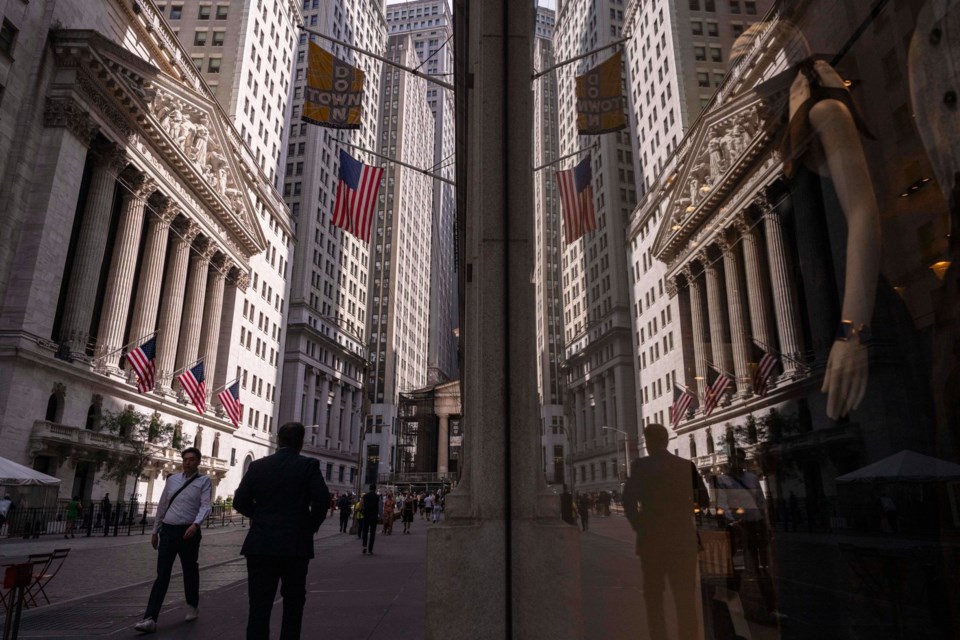Stocks closed lower on Wall Street, pulling the S&P 500 and the Nasdaq composite below the records they set a day earlier. The S&P 500 fell 0.3% Friday. The Dow Jones Industrial Average gave back 0.6%. The Nasdaq composite slipped 0.2%. Levi Strauss jumped 11% after the jeans maker easily beat Wall Street’s sales and profit targets and raised its full-year forecast, despite expecting higher costs from tariffs. European markets closed broadly lower, and Asian markets closed mixed. Treasury yields rose in the bond market. The yield on the 10-year Treasury note climbed to 4.42%.
THIS IS A BREAKING NEWS UPDATE. AP’s earlier story follows below.
U.S. stocks are lower in afternoon trading Friday, pulling the market back from all-time highs, as the Trump administration escalates its tariff threats against Canada.
The S&P 500 was down 0.2% a day after setting a record high. The benchmark index is on pace to post its first weekly loss in three weeks.
The Dow Jones Industrial Average fell 243 points, or 0.6%, as of 3:26 p.m. Eastern time. The Dow is also on track for a weekly loss. The Nasdaq composite was down 0.1% after drifting between small gains and losses. The tech-heavy index climbed to an all-time high on Thursday.
Bond yields rose. The yield on the 10-year Treasury rose to 4.43%, from 4.34% late Thursday.
President Donald Trump said in a letter Thursday that he will raise taxes on many imported goods from Canada to 35%, deepening the rift between the longtime North American allies. The letter to Canadian Prime Minister Mark Carney is an aggressive increase to the top 25% tariff rates that Trump first imposed in March.
The move is the latest bid by the White House to use threats of higher tariffs on goods imported into the U.S. in hopes of securing new trade agreements with countries around the globe, even historically close trading partners like Canada.
The administration had initially set Wednesday as a deadline for countries to make deals with the U.S. or face heavy increases in tariffs. But with just two trade deals announced since April, one with the United Kingdom and one with Vietnam, the window for negotiations has been now been extended to Aug. 1.
Trump also floated this week that he would impose tariffs of as much as 200% on pharmaceutical drugs and place a 50% tariff on copper imports, matching the rates charged on steel and aluminum.
The initial rollout of Trump's tariff policies in the spring roiled financial markets. But Wall Street has been relatively stable in recent weeks, with stocks steadily rising to record levels That suggests the market has mostly adjusted to the unpredictability of Trump's rapidly shifting tariffs. Some market watchers, however, aren’t so sure.
The market's response to Trump's tariff escalation this week “has been surprisingly muted. Markets appear to believe that Trump will again back down,” Paul Ashworth, chief North America economist at Capital Economics, wrote Friday. “We are not so sure.”
Trade policy aside, the market is now set to shift at least some of its focus on companies due to report quarterly earnings over the next few weeks.
On Friday, Levi Strauss jumped 11.3% after the jeans maker easily beat Wall Street’s sales and profit targets and raised its full-year forecast, despite expecting higher costs from tariffs.
PriceSmart climbed 6.5% a day after the warehouse club operator delivered solid third-quarter results and said it's looking into expanding into Chile.
Earnings season shifts into high gear next week with JPMorgan Chase, Wells Fargo and Citigroup among the big banks due to report their results on Tuesday.
Shares in financial and health care sector companies were the biggest weights on the market Friday.
Visa fell 2.5% and Gilead Sciences dropped 3.5%.
Several airline stocks were down a day after encouraging quarterly results from Delta Air Lines set off a rally in the sector. Delta slipped 0.4%, United fell 4.5% and American gave up 5.2%.
Elsewhere in the market, shares of T-Mobile were little changed after the Justice Department announced Thursday that it would not prevent the company from closing on its proposed $4.4 billion acquisition of U.S. Cellular. That deal, announced more than a year ago, had come under antitrust scrutiny from the Justice Department under President Joe Biden’s administration.
U.S. Cellular shares rose 4%.
Shares in aviation company Red Cat Holdings jumped 23.7% after Defense Secretary Pete Hegseth issued orders aimed at ramping up production and deployment of drones.
European stock indexes closed broadly lower following a mostly lower finish in Asian markets.
Meanwhile, bitcoin climbed to another all-time high Friday, briefly eclipsing $118,000 before easing back to around $117,893, according to Coindesk.
Bitcoin's price jump came amid bullish momentum across risk assets and coincides with Nvidia’s surge to a $4 trillion valuation. It also comes days before the U.S. Congress’ Crypto Week on July 14, where lawmakers will debate a series of bills that could define the regulatory framework for the industry.
Alex Veiga, The Associated Press



